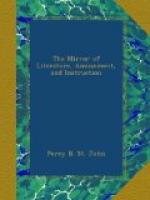(For the Mirror.)
James the First.
Robert Cecil, great grandson to the first Earl of
Salisbury, told Lord
Dartmouth that his ancestor, inquiring into the character
of king James,
Bruce (his majesty’s own ambassador) answered,
“Ken ye a John Ape? en
I’s have him, he’ll bite you; en
you’s have him, he’ll bite me.”
Sir Edward Seymour.
Speaker of the House of Commons, was one day coming to his duty, when his coach happening to break down, he ordered the beadle to stop the first gentleman’s coach they met, and bring it to him. The owner felt much surprised to be turned out of his own coach; but Sir Edward told him it was much more proper for him to walk in the streets than the speaker of the House of Commons; and accordingly left him to do so without farther apology.—This arbitrary exercise of authority is perhaps without a parallel.
Henry the Fourth.
Of France used to say that a king should have the heart of a child towards God, but the heart of a father towards his subjects.
George the Third.
His late majesty was very partial to Mr. Carbonel, the wine-merchant, and frequently admitted him to the royal hunts. Returning from the chase one day, the king entered affably into conversation with his wine-merchant, and rode with him side by side a considerable distance. Lord Walsingham was in attendance, and watching an opportunity, called Mr. C. aside, and whispered something to him. “What’s that? what has Walsingham been saying to you?” inquired the good-humoured monarch. “I find, sire, I have been unintentionally guilty of disrespect by not taking off my hat when I address your majesty; but you will please to observe, that whenever I hunt my hat is fastened to my wig, and my wig to my head; and as I am mounted on a very spirited horse, if any thing goes off, we must all go off together.” The king laughed heartily at the whimsical apology.
The Duke of Wellington.
A certain noble lord, who was the duke’s aide-de-camp, visited his grace early on the morning of the battle of Salamanca, and perceiving him lying on a very small camp bedstead, observed, “that his grace had not room to turn himself;” who immediately, in his usual characteristic manner, rejoined, “When you have lived as long and seen so much as I have, you will know, that when a general thinks of turning in his bed, it is full time to turn out.”
Rubens.
An artist named Brendel, possessed with the folly of the “philosopher’s stone,” proposed to Rubens to join him in the discovery of that mystery. He replied, “Your application is too late; for these twenty years past my pencils and pallet have revealed to me the secret about which you are so anxious.”
Queen Elizabeth.
When the ambassador of Henry IV. of France was in England, the queen asked him one birth-night, which was attended by a splendid assembly of the court, how he liked her ladies. Knowing her majesty was not averse to flattery, he made the following elegant reply: “It is hard, madam, to judge of stars in the presence of the sun.”




